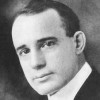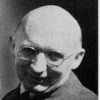Yet it is certain, likewise, that many of our miseries are merely comparative: we are often made unhappy, not by the presence of any real evil, but by the absence of some fictitious good; of something which is not required by any real want of nature, which has not in itself any power of gratification, and which neither reason nor fancy would have prompted us to wish, did we not see it in the possession of others.
Samuel Johnson (1709-1784) English writer, lexicographer, critic
Essay (1753-11-27), The Adventurer, No. 111
(Source)
Quotations about:
want
Note not all quotations have been tagged, so Search may find additional quotes on this topic.
We have been accused of being selfish, and it has been said that we will want more; that last year we got an advance of ten cents and now we want more. We do want more. You will find that a man generally wants more. Go and ask a tramp what he wants, and if he doesn’t want a drink he will want a good, square meal. You ask a workingman, who is getting two dollars a day, and he will say that he wants ten cents more. Ask a man who gets five dollars a day and he will want fifty cents more. The man who receives five thousand dollars a year wants six thousand a year, and the man who owns eight or nine hundred thousand dollars will want a hundred thousand dollars to make it a million, while the man who has his millions will want everything he can lay his hands on and then raise his voice against the poor devil who wants ten cents more a day.
Samuel Gompers (1850-1924) British-American cigar maker, activist, labor leader [b. Samuel Gumpertz]
Speech (1890-05-01), “What Does the Working Man Want,” American Federation of Labor Convention, Louisville, Kentucky
(Source)
YEVGRAF: I told myself it was beneath my dignity to arrest a man for pilfering firewood. But nothing ordered by the Party is beneath the dignity of any man. And the Party was right: one man desperate for a bit of fuel is pathetic; five million people desperate for fuel will destroy a city.
Robert Bolt (1924-1995) English dramatist
Doctor Zhivago, film (1965)
(Source)
Watching Yuri scavenging wood from a fence.
This line is not in the 1957 Boris Pasternak novel.
The more I want to get something done, the less I call it work.
Richard Bach (b. 1936) American writer
Illusions: The Adventures of a Reluctant Messiah, ch. 3 (1977)
(Source)
In the future days, which we seek to make secure, we look forward to a world founded upon four essential human freedoms.
The first is freedom of speech and expression — everywhere in the world.
The second is freedom of every person to worship God in his own way — everywhere in the world.
The third is freedom from want — which, translated into world terms, means economic understandings which will secure to every nation a healthy peacetime life for its inhabitants — everywhere in the world.
The fourth is freedom from fear — which, translated into world terms, means a world-wide reduction of armaments to such a point and in such a thorough fashion that no nation will be in a position to commit an act of physical aggression against any neighbor — anywhere in the world.
That is no vision of a distant millennium. It is a definite basis for a kind of world attainable in our own time and generation. That kind of world is the very antithesis of the so-called new order of tyranny which the dictators seek to create with the crash of a bomb.Franklin Delano Roosevelt (1882-1945) American lawyer, politician, statesman, US President (1933-1945)
Speech (1941-01-06) to Congress, Annual Message (State of the Union), “Four Freedoms,” Washington, D. C.
(Source)
FDR's first presentation of his "Four Freedoms" framework.
No, what was sad in his case was that he, who didn’t care for carved oak, should have his drawing-room paneled with it, while people who do care for it have to pay enormous prices to get it. It seems to be the rule of this world. Each person has what he doesn’t want, and other people have what he does want.
Jerome K. Jerome (1859-1927) English writer, humorist [Jerome Klapka Jerome]
Three Men in a Boat (To Say Nothing of the Dog), ch. 6 (1889)
(Source)
He is not poore that hath little, but he that desireth much.
George Herbert (1593-1633) Welsh priest, orator, poet.
Jacula Prudentum, or Outlandish Proverbs, Sentences, &c. (compiler), # 309 (1640 ed.)
(Source)
Poverty wants some things, Luxury many things, Avarice all things.
Benjamin Franklin (1706-1790) American statesman, scientist, philosopher, aphorist
Poor Richard (1735 ed.)
(Source)
We sleek, well-fed folk can hardly realize what feeling hungry is like. We know what it is to have no appetite and not to care for the dainty victuals placed before us, but we do not understand what it means to sicken for food — to die for bread while others waste it — to gaze with famished eyes upon coarse fare steaming behind dingy windows, longing for a pen’orth of pea pudding and not having the penny to buy it — to feel that a crust would be delicious and that a bone would be a banquet.
Jerome K. Jerome (1859-1927) English writer, humorist [Jerome Klapka Jerome]
Idle Thoughts of an Idle Fellow, “On Eating and Drinking” (1886)
(Source)
Foolish people, I say, then, who have never experienced much of either, will tell you that mental distress is far more agonizing than bodily. Romantic and touching theory! so comforting to the love-sick young sprig who looks down patronizingly at some poor devil with a white starved face and thinks to himself, “Ah, how happy you are compared with me!” — so soothing to fat old gentlemen who cackle about the superiority of poverty over riches. But it is all nonsense — all cant. An aching head soon makes one forget an aching heart. A broken finger will drive away all recollections of an empty chair. And when a man feels really hungry he does not feel anything else.
Jerome K. Jerome (1859-1927) English writer, humorist [Jerome Klapka Jerome]
Idle Thoughts of an Idle Fellow, “On Eating and Drinking” (1886)
(Source)
If he is poor who is full of Desires, nothing can equal the Poverty of the Ambitious and the Covetous.
[S’il est vrai que l’on soit pauvre par toutes les choses que l’on désire, l’ambitieux et l’avare languissent dans une extrême pauvreté.]Jean de La Bruyère (1645-1696) French essayist, moralist
The Characters [Les Caractères], ch. 6 “Of Gifts of Fortune [Des Biens de Fortune],” § 49 (6.49) (1688) [Browne ed. (1752)]
(Source)
(Source (French)). Alternate translations:If he is only poor who desires much, and is always in want; the Ambitious and the Covetous languish in extreme Poverty.
[Bullord ed. (1696)]If a Man is poor, by all the things which he longs for, the Ambitious and Covetous languish in extreme Poverty.
[Curll ed. (1713)]If a man be poor who wishes to have everything, then an ambitious and a miserly man languish in extreme poverty.
[tr. Van Laun (1885)]If it is true that poverty consists in desiring a great many things, the ambitious man and the miser suffer from extreme poverty.
[tr. Stewart (1970)]
If it be true that a man is rich who wants nothing, a wise man is a very rich man.
[S’il est vrai que l’on soit riche de tout ce dont on n’a pas besoin, un homme fort riche, c’est un homme qui est sage.]Jean de La Bruyère (1645-1696) French essayist, moralist
The Characters [Les Caractères], ch. 6 “Of Gifts of Fortune [Des Biens de Fortune],” § 49 (6.49) (1688) [tr. Van Laun (1885)]
(Source)
(Source (French)). Alternate translations:If he is only rich who wants nothing, a very wise Man is a very rich Man.
[Bullord ed. (1696)]If a Man is rich, by all which he does not want, a wise Man is a very rich Man.
[Curll ed. (1713)]If he is rich who wants nothing, a very wise Man is a very rich Man.
[Browne ed. (1752)]If it is true that wealth consists in having few wants, the wise man is a very wealthy man.
[tr. Stewart (1970)]
In truth, it is not want, but rather abundance, that breeds avarice.
[De vray, ce n’est pas la disette, c’est plustost l’abondance qui produict l’avarice.]
Michel de Montaigne (1533-1592) French essayist
Essays, Book 1, ch. 14 (1.14), “The Taste of Good and Bad Things Depends Mostly on the Opinion We Have of Them [Que le goust des biens et des maux despend en bonne partie de l’opinion que nous en avons]” (1572) [tr. Frame (1943)]
(Source)
Though this chapter was written around 1572 for the 1580 edition, this text was added for the 1588 edition. The chapter as a whole was numbered ch. 14 in the 1580 and 1588 editions, moved to ch. 40 for the 1595 ed. Most modern translations use the original numbering.
(Source (French)). Alternate translations:Verily, it is not want, but rather plenty that causeth avarice.
[tr. Florio (1603), ch. 40]In plain truth, it is not Want, but rather Abundance, that Creates Avarice.
[tr. Cotton (1686), ch. 40]In truth, it is not want, but rather abundance, that creates avarice.
[tr. Cotton/Hazlitt (1877), ch. 40]In truth, it is not want, but rather abundance, which gives birth to avarice.
[tr. Ives (1925)]And truly it is not want that produces avarice but plenty.
[tr. Screech (1987)]Truly, abundance rather than want causes stinginess.
[tr. HyperEssays (2023)]
What Nature wants, commodious Gold bestows,
‘Tis thus we eat the bread another sows:
But how unequal it bestows, observe,
‘Tis thus we riot, while who sow it, starve.
What Nature wants (a phrase I much distrust)
Extends to Luxury, extends to Lust;
And if we count among the Needs of life
Another’s Toil, why not another’s Wife?
Useful, we grant, it serves what life requires,
But dreadful too, the dark Assassin hires:
Trade it may help, Society extend;
But lures the Pyrate, and corrupts the Friend:
It raises Armies in a nation’s aid,
But bribes a Senate, and the Land’s betray’d.Alexander Pope (1688-1744) English poet
“An Epistle to Allen, Lord Bathurst: Of the Use of Riches” (1733), Moral Essays, Epistle 3 (1735)
(Source)
Where bread is wanting, all’s to be sold.
Benjamin Franklin (1706-1790) American statesman, scientist, philosopher, aphorist
Poor Richard (1733)
(Source)
Art followed hard on art. Toil triumphed over every obstacle, unrelenting Toil, and Want that pinches when life is hard.
[Tum variae venere artes. Labor omnia vicit
inprobus et duris urgens in rebus egestas.]Virgil (70-19 BC) Roman poet [b. Publius Vergilius Maro; also Vergil]
Georgics [Georgica], Book 1, l. 145ff (1.145) (29 BC) [tr. Fairclough (Loeb) (1916)]
(Source)
On humanity developing the arts and sciences in response to Jove making life difficult.
Compare this to Labor omnia vincit ("Work conquers all"), Oklahoma's state motto.
(Source (Latin)). Alternate translations:Then came strange arts, fierce labor all subdues.
Inforc'd by bold Necessity, and Want.
[tr. Ogilby (1649)]And various Arts in order did succeed,
(What cannot endless Labour urg'd by need?)
[tr. Dryden (1709), ll. 217-218]Thus by long labour arts to arts succeed,
Such is the force of all-compelling need.
[tr. Nevile (1767)]Thus rous'd by varied wants new arts arose,
And strenuous Labour triumph'd at its close.
[tr. Sotheby (1800)]Then various arts ensued. Incessant labour and want, in hardships pressing, surmounted every obstacle.
[tr. Davidson (1854)]Then came the various arts: oh, grand success
Of reckless toil and resolute distress!
[tr. Blackmore (1871)]Then came the various arts of life. So toil, relentless toil, and the pressure of want in adversity, conquered the world. [tr. Wilkins (1873)]Then divers arts arose; toil conquered all,
Remorseless toil, and poverty's shrewd push
In times of hardship.
[tr. Rhoades (1881)]Thus stern Necessity inventive tried
Fresh arts, which life’s increasing wants supplied.
[tr. King (1882)]Then various arts followed. Unwearying labor overcame every difficulty, and want spurring men on in times of hardship.
[tr. Bryce (1897)]Then arts many in sort; nothing but yielded to unrelenting toil and the hard pressure of poverty.
[tr. Mackail (1899)]Then divers arts arose; toil conquered all,
Remorseless toil, and poverty's shrewd push
In times of hardship.
[tr. Greenough (1900)]Then followed manifold arts: unflinching toil ever one
Triumphs: in hardship's school stern need still drave men on.
[tr. Way (1912)]Then later times
Brought forth of other arts the varied skill.
Work conquered all, relentless, obstinate,
While poverty and hardship urged it on.
[tr. Williams (1915)]Then numerous arts arose. Yes, unremitting labour
And harsh necessity's hand will master anything.
[tr. Day-Lewis (1940)]Then followed all the civilizing arts:
Hard labor conquered all, and pinching need.
[tr. Bovie (1956)]Then all kinds of skills came into being. Toil has overcome all things, runious toil and need, pressing in harsh circumstances.
[tr. Miles (1980)]And last the various arts.
Toil mastered everything, relentless toil
And the pressure of pinching poverty.
[tr. Wilkinson (1982)]Then came the various arts. Hard labour conquered all,
and poverty’s oppression in harsh times.
[tr. Kline (2001)] https://www.poetryintranslation.com/PITBR/Latin/VirgilGeorgicsI.php#anchor_Toc533589845:~:text=then%20came%20the,in%20harsh%20times.Then came the arts in many guises. Relentless work conquered
all difficulties -- work and urgent need when times were hard.
[tr. Lembke (2004)]All this before the knowledge and know-how which ensued. Hard work prevailed, hard work and pressing poverty.
[tr. Fallon (2006)]And then myriad arts. Toil subdued the earth, relentless toil, and the prick of dearth in hardship.
[tr. Johnson (2009)]Then followed other arts; and everything
Was toil, relentless toil, urged on by need.
[tr. Ferry (2015)]
Wise is he who instead of grieving over what he lacks delights in what he has.
[Εὐγνώμων ὁ μὴ λυπεόμενος ἐφ’ οἷσιν οὐκ ἔχει, ἀλλὰ χαίρων ἐφ’ οἷσιν ἔχει.]
Democritus (c. 460 BC - c. 370 BC) Greek philosopher
Frag. 231 (Diels) [tr. @sententiq (2016)]
(Source)
Original Greek. Diels citation "231 (61 N.)"; collected in Joannes Stobaeus (Stobaios) Anthologium III, 17, 25. Bakewell lists this under "The Golden Sayings of Democritus." Freeman notes this as one of the Gnômae, from a collection called "Maxims of Democratês," but because Stobaeus quotes many of these as "Maxims of Democritus," they are generally attributed to the latter. Alternate translations:
- "A sensible man takes pleasure in what he has instead of pining for what he has not." [tr. Bakewell (1907)]
- "The right-minded man is he who is not grieved by what he has not, but enjoys what he has." [tr. Freeman (1948)]
- "A man of sound judgement is not grieved by what he does not possess but rejoices in what he does possess." [tr. Barnes (1987)]
- "A sensible man does not grieve for what he has not, but enjoys what he has." [Source]
It is the mark of a child not an adult to desire without measure.
[Παιδός, οὐκ ἀνδρὸς τὸ ἀμέτρως ἐπιθυμεῖν.]
Democritus (c. 460 BC - c. 370 BC) Greek philosopher
Frag. 70 (Diels) [tr. @sententiq (2018), fr. 69]
(Source)
It is of the nature of desire not to be satisfied, and most men live only for the gratification of it.
[ἄπειρος γὰρ ἡ τῆς ἐπιθυμίας φύσις, ἧς πρὸς τὴν ἀναπλήρωσιν οἱ πολλοὶ]
Aristotle (384-322 BC) Greek philosopher
Politics [Πολιτικά], Book 2, ch. 7, sec. 19 / 1267b.4 [tr. Jowett (1885)]
(Source)
Original Greek. Alt. trans.:
- "For it is the nature of our desires to be boundless, and many live only to gratify them." [tr. Ellis (1912)]
- "For appetite is in its nature unlimited, and the majority of mankind live for the satisfaction of appetite." [tr. Rackham (1924)]
- "For the nature of desire is without limit, and it is with a view to satisfying this that the many live. [tr. Lord (1984)]
We are all more blind to what we have than to what we have not.
Audre Lorde (1934-1992) American writer, feminist, civil rights activist
“Notes from a Trip to Russia,” Sister Outsider (1984)
(Source)
Poverty of goods is easy to cure, poverty of soul impossible.
[La pauvreté des biens, est aisée à guerir, la pauvreté de l’ame, impossible.]
Michel de Montaigne (1533-1592) French essayist
Essays, Book 3, ch. 10 (3.10), “Of Managing the Will [De mesnager sa volonté]” (1586) [tr. Frame (1943)]
(Source)
In context, "poverty of the soul" is given by Montaigne, not as a moral failing, but as the soul-felt sense of poverty, of not having enough, of needing to attain more.
The essay, including this passage, first appeared in the 2nd ed. (1588).
(Source (French)). Alternate translations:Want of goods may easilie be cured, but the poverty of the mind, is incurable.
[tr. Florio (1603)]The Want of Goods, is easily repair'd; but the Poverty of the Soul is irreparable.
[tr. Cotton (1686)]The poverty of goods is easily cured; the poverty of the soul is irreparable.
[tr. Cotton/Hazlitt (1877)]Poverty in worldly goods is easy to cure; poverty of the soul, impossible.
[tr. Ives (1925)]To cure poverty of possessions is easy: poverty of soul impossible.
[tr. Screech (1987)]Poverty of possessions may easily be cured, but poverty of soul never.
[Source]
An American Government cannot permit Americans to starve.
Franklin Delano Roosevelt (1882-1945) American lawyer, politician, statesman, US President (1933-1945)
Speech, San Diego Exposition (2 Oct 1935)
(Source)
Want is a growing giant whom the coat of Have was never large enough to cover.
Ralph Waldo Emerson (1803-1882) American essayist, lecturer, poet
Essay (1860), “Wealth,” The Conduct of Life, ch. 3
(Source)
Based on a course of lectures, "The Conduct of Life," delivered in Pittsburg (1851-03).
You can’t always get what you want.
But if you try sometimes,
You just might find
You get what you need.Michael Philip "Mick" Jagger (b. 1943) English musician, songwriter, producer, actor
“You Can’t Always Get What You Want” [with Keith Richards] (1969)
(Source)
Never a possession, always the possessor, with skin as pale as smoke, and eyes tawny and sharp as yellow wine: Desire is everything you have ever wanted. Whoever you are. Whatever you are.
Everything.
Neil Gaiman (b. 1960) British author, screenwriter, fabulist
Sandman, Book 4. Season of Mists, # 21 “A Prologue” (1990-11)
(Source)
Our frustration is greater when we have much and want more than when we have nothing and want some. We are less dissatisfied when we lack many things than when we seem to lack but one thing.
Eric Hoffer (1902-1983) American writer, philosopher, longshoreman
True Believer: Thoughts on the Nature of Mass Movements, Part 2, ch. 4, § 23 (1951)
(Source)
There is something wrong in a government where they who do the most have the least. There is something wrong when honesty wears a rag, and rascality a robe; when the loving, the tender, eat a crust, while the infamous sit at banquets.
Robert Green Ingersoll (1833-1899) American lawyer, freethinker, orator
Speech (1886-11-14), “A Lay Sermon,” American Secular Union annual congress, Chickering Hall, New York City
(Source)
KIRK: Charlie, there are a million things in this universe you can have and there are a million things you can’t have. It’s no fun facing that, but that’s the way things are.
CHARLIE: Then what am I going to do?
KIRK: Hang on tight and survive. Everybody does.
CHARLIE: You don’t.
KIRK: Everybody, Charlie. Me, too.
D. C. Fontana (1939-2019) television screenwriter, story editor [Dorothy Catherine Fontana]
Star Trek, 2×02 “Charlie X” [Prod. 08] (1966-09-15) [with Gene Roddenberry]
(Source)
(Source (Video); dialog verified.)
The millions who are in want will not stand by silently forever while the things to satisfy their needs are within easy reach.
Franklin Delano Roosevelt (1882-1945) American lawyer, politician, statesman, US President (1933-1945)
Speech (1932-05-22), Commencement, Oglethorpe University, Atlanta, Georgia
(Source)
Unhappiness is not knowing what we want and killing ourselves to get it.
Don Herold (1889-1966) American humorist, cartoonist, author
(Attributed)
(Source)
Quoted in Lawrence Peter, Peter's People (1979) as "Herold's Law."
Cats seem to go on the principle that it never does any harm to ask for what you want.
Joseph Wood Krutch (1893-1970) American educator, writer, critic, naturalist
The Twelve Seasons, “February” (1949)
(Source)
All sins are attempts to fill voids.
Simone Weil (1909-1943) French philosopher
Gravity and Grace [La Pesanteur et la Grâce], “To Desire Without An Object” (1947) [ed. Thibon] [tr. Crawford/von der Ruhr (1952)]
(Source)
The human animal, like others, is adapted to a certain amount of struggle for life, and when by means of great wealth homo sapiens can gratify all his whims without effort, the mere absence of effort from his life removes an essential ingredient of happiness. The man who acquires easily things for which he feels only a very moderate desire concludes that the attainment of desire does not bring happiness. If he is of a philosophic disposition, he concludes that human life is essentially wretched, since the man who has all he wants is still unhappy. He forgets that to be without some of the things you want is an indispensable part of happiness.
Bertrand Russell (1872-1970) English mathematician and philosopher
Conquest of Happiness, Part 1, ch. 2 “Byronic Unhappiness” (1930)
(Source)

































